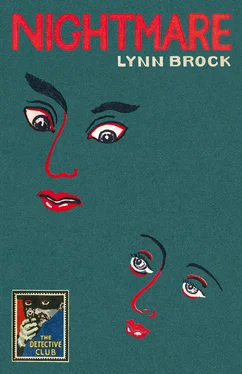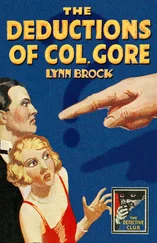On one of these morning promenades he had for the first time an experience which was subsequently to become familiar to him—a sudden sick dizziness, accompanied by a sensation that every drop of blood in his body had turned to lead. His legs sagged under him. He came to a stop struggling with an onset of violent depression, bodily and mental. These curious disturbances, however, passed away almost instantly. He attributed them to a too hearty breakfast and the coldness of the December morning, continued his walk, and had forgotten all about them before he reached the hospital.
A week or so later he had another attack of the same kind after his bath. Altering his diagnosis, he cut down his smoking for some days. There were more important things to think about than little attacks of dizziness and shivers. His long-delayed demobilisation had been rushed through and he was a free man once more. And Mr Loxton, relenting of his inhospitality, had invited Elsa and her husband to become his guests until their departure to Surrey.
Mr Loxton had weighed a good deal on Whalley’s mind lately. He was a squarely-built, brusque man of sixty-two, a prominent figure in the public life of Dunpool, one of the leaders of its commercial plutocracy, and still the active senior partner of the most important firm of iron-founders in the west of England. He lived in an imposing house in the outskirts of Rockwood, entertained lavishly, got up at six o’clock every morning, neither smoked nor drank anything stronger than water, and never spoke without stating a fact or asking someone else to state one. He was childless; after her father’s death Elsa had lived with him, managed his house for him, and been regarded by him, generally, as a daughter. One did not desire Mr Loxton’s death; but some time, probably within the next fifteen years, he would die. The reasonable supposition was that he would leave some considerable portion of his money to his two nieces. The thought that his own unsatisfactoriness as a nephew-in-law should have endangered Elsa’s personal prospects had worried Whalley seriously since their return to Rockwood.
Mr Loxton, however, was geniality itself during the short visit. After dinner on Christmas Day he held up a glass of water and abandoned the ‘Whalley’ to which ‘Captain Whalley’ had already been softened.
‘Well, Simon, my boy, here’s to those plays of yours. Don’t forget that I’m to have a box whenever you have a first night.’
And on the last day of December, just before they started for Surrey, he handed Elsa a cheque for five hundred pounds.
‘I expect you’ll want a car of some sort, young woman. If that isn’t enough let me know. If it’s too much, spend what’s over on a perambulator.’
Elsa’s sister, Mrs Canynge, remained, however, cold. Her husband—he was, Whalley discovered, the managing director of the firm of Loxton & Ferrier, Ltd.—took the trouble to display a marked incivility. Elsa’s personal friends, however, were all charming to him. Amongst them was a cheery, pleasant little man of thirty-seven or so, named Knayle, of whom he was to see more later on, and who, he learned, had known Elsa all her life. Mr Knayle, whom she called ‘Harvey’, addressed her as ‘Elsa’—apparently as a matter of course—and was much interested to learn that her husband had written That Mrs Mallaby and The Vanity Bag , both of which he remembered having seen and greatly enjoyed. He invited them to tea at his flat and proved the most entertaining and sympathetic of hosts.
They arrived at the cottage at Puttiford in the dusk of a frosty afternoon. It was a veritable homecoming. The red curtains of the little latticed windows were all lighted up. Silhouetted in the porch stood the maternal woman from the village who was to ‘do for’ them. They went into the cosy little sitting-room, and found a crackling fire of pine logs and a sumptuous tea awaiting them. Hand in hand, like two happy children, they stood looking about them silently until Mrs Hidgson had finally withdrawn, then, attracted by the hooting of an owl just outside one of the windows, drew aside its curtain. Whalley’s best efforts, however, failed to open the window, and he drew the curtain across again with a puckered frown. During tea he was a little abstracted and, half-way through the meal, rose to make another trial of the window, equally unsuccessful.
‘Always the way with these picturesque old houses,’ he said, returning to her. ‘The windows won’t open—or, if they open, they won’t shut. I wonder if there are any tools in the place. We must get that window right straight away.’
And immediately after tea, before he unpacked, he hunted down an aged screwdriver, repaired its haft, and eased the jammed sash. From her chair before the fire Elsa watched him with amusement and some surprise. Afterwards, however, they spent an evening of rapturous contentment.
Elsa revealed herself as the most capable of cooks and managers. Mrs Higson proved the most efficient of ‘doers for’. The little house was kept as neat and bright as a new pin. Its equipment—including gas-supply and indoor sanitation—was entirely satisfactory. The local tradespeople were obliging. The Guildford shops were but half an hour away by bus. London could be reached in an hour and a half. Puttiford’s delightful common and golf-links began at the front door. All the loveliness of Surrey lay around them. They bought a small car, joined the golf-club, made friends with the score or so of agreeable people who were their neighbours, and ran up to town every week for a theatre or a concert. Everything, in fine, connected with their cottage was delightful except that, after a couple of months, Whalley discovered that he couldn’t write plays in it.
On the morning of the second day after their arrival he shut himself up in the tiny room between the kitchen and the sitting-room which he had arranged as his own special sanctum. Its one little window faced north, however; the sun never came into it; it was rather damp, and it had no fireplace. The oil stove smelt and he put it out, chilled down, became oppressed by the smallness and darkness of the room and the busy clatter of the kitchen next door. He adjourned to the sitting-room; but a clothes-horse draped with airing-sheets had been drawn across its fire. After half an hour of disjointed musings, he went out and inspected the garden, which, he decided, would want a lot of tidying-up. Then he remembered that his foot had caught in the bedroom carpet when he had entered it on the preceding night. Failing to find either tacks or hammer, he went off to the village to procure them. On his way he met the genial secretary of the golf-club and was easily persuaded to return to the cottage, collect his clubs, and play a very pleasant eighteen holes.
In the afternoon Elsa and he went for a long walk, returning just in time for tea. After tea he remembered the tacks and the hammer and hurried off to the village. The bedroom carpet, he discovered, required tacking down all round. To do this it was necessary to move most of the furniture. Descending to the sitting-room he found Elsa in the firelight. They sat there until it was time to change for the meal which they had decided to call supper. Afterwards he retreated again to his sanctum and for nearly an hour sat there, endeavouring to entice his thoughts away from their endless retracings of the past four months. They refused, however, to submit to any control—jumped to and fro, from his first walk with Elsa to their walk that afternoon—to the car they would have to get—to Mr Loxton and the unlikelihood of his living beyond seventy-five—to his own father’s death at sixty-eight—back to Elsa. Some day—incredible, desolating horror—one of them would die and leave the other. Every moment that he lived must be lived for her—with her. She was alone now—in there in the sitting-room. He had left her alone for a whole hour. But he must leave her alone—sometimes. It was impossible to think except of her when he was with her. And yet … that hour had gone from them. Yes—there was a deuce of a lot to be done in that garden. But the garden mustn’t be allowed to interfere with the things that really had to be done. Nor golf. It had been a very jolly game that morning—that iron of his at the seventeenth had been rather a beauty. Pleasant chap, the secretary. He had said that his wife would call. He mustn’t forget to tell Elsa.
Читать дальше












